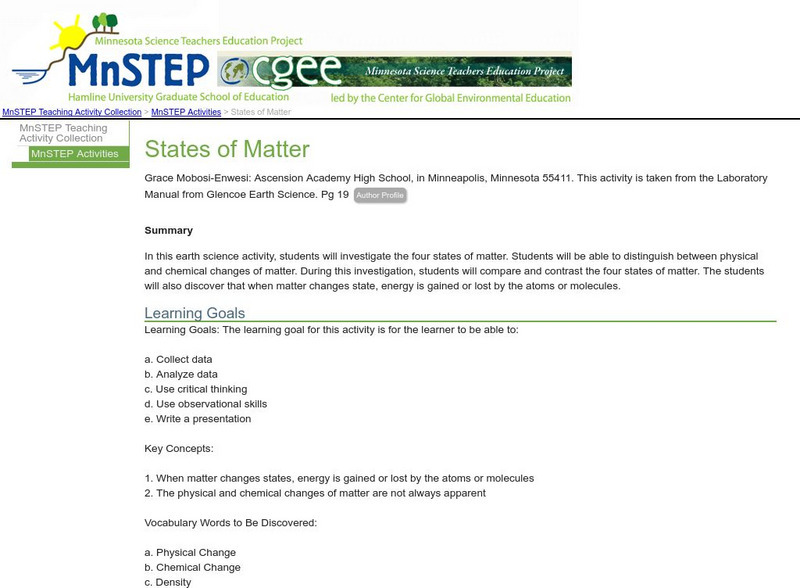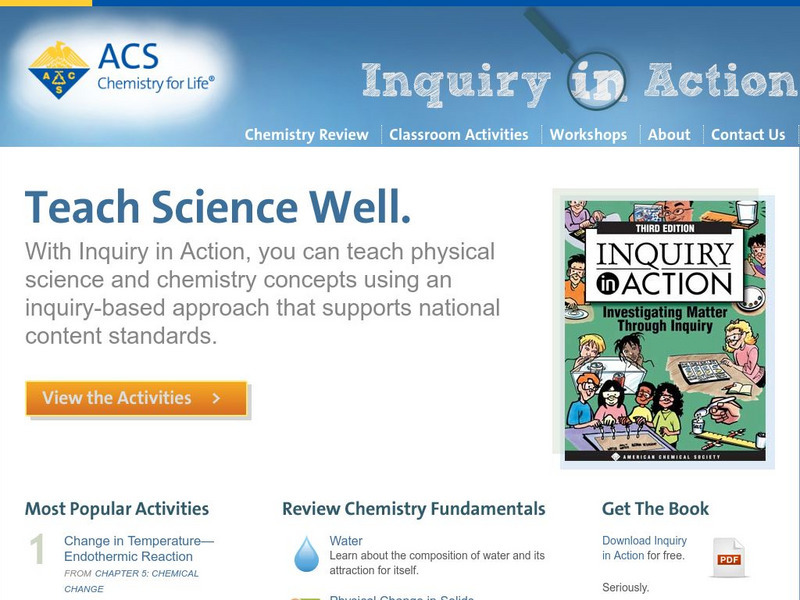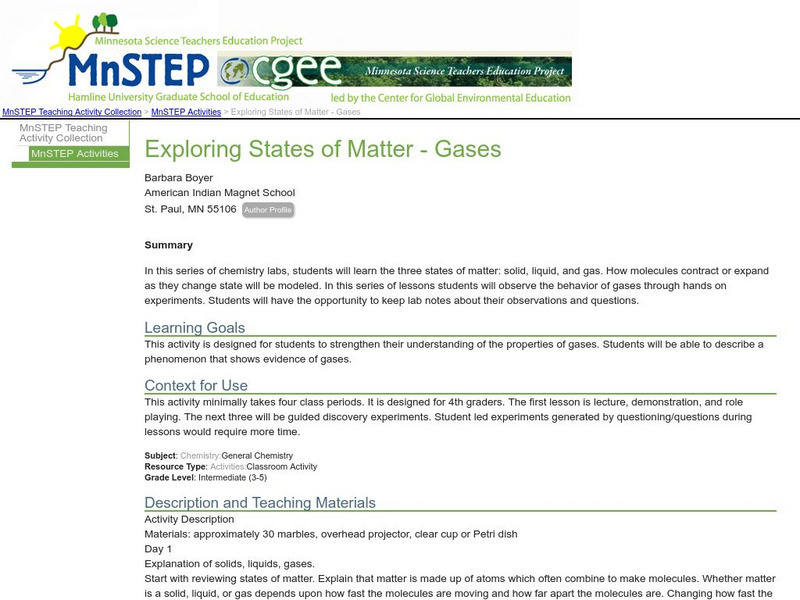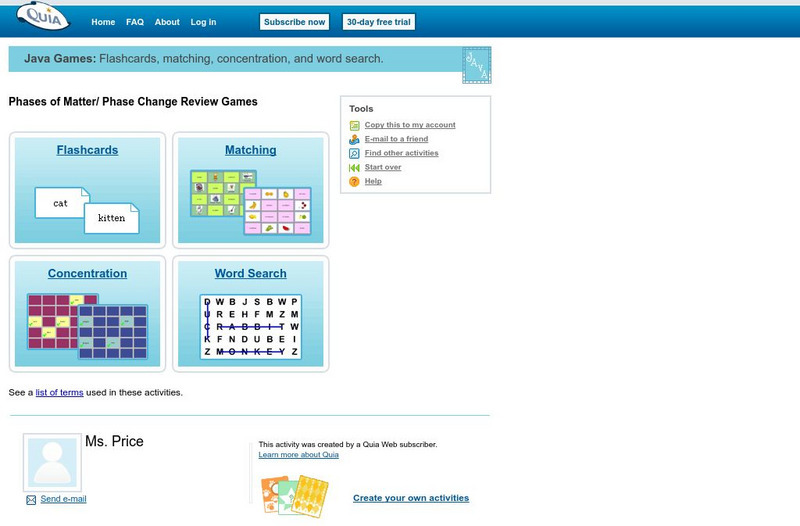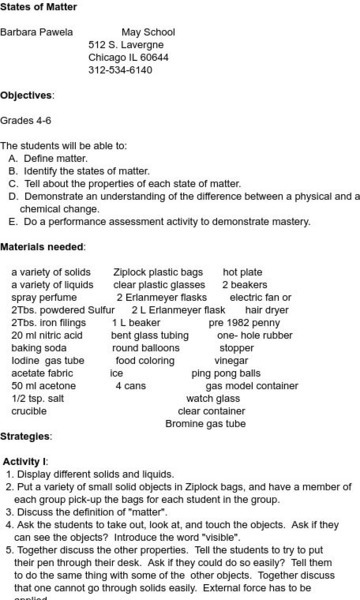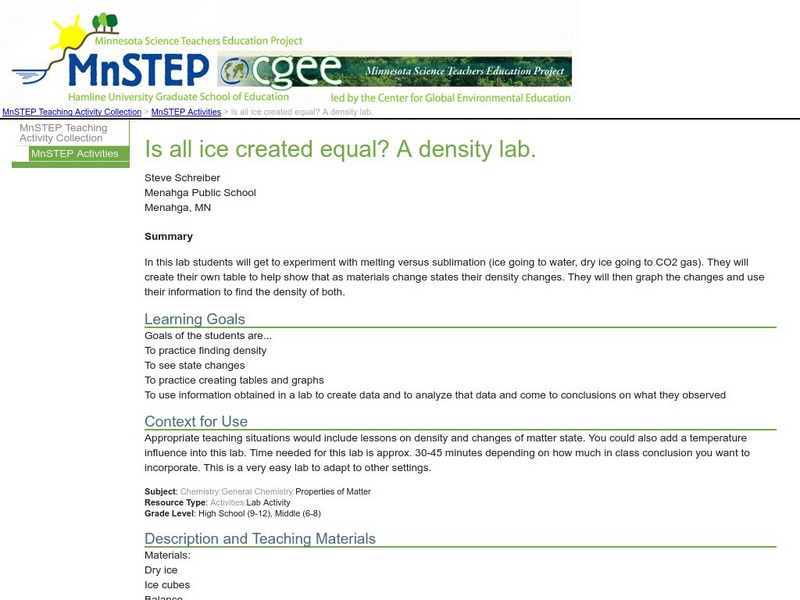Other
Science4 Us: Changes in Matter
Through an instructional video, games, and activities, students explore three types of change matter makes: physical change, in which only the shape of the matter changes; physical phase change in which matter changes to a different form...
Utah STEM Foundation
Utah Stem Action Center: Changes in Matter
The goal of this activity is to develop and use a model to describe that matter is made of particles on a scale that is too small to be seen. You will be making observations of changes supported by a particle model of matter.
Utah Education Network
Uen: Matter, It Does!
In this activity students identify forms and changes of matter.
American Chemical Society
Inquiry in Action: From Liquid to Gas to Solid
What causes frost to form on the outside of a cold container? In this activity, students will see that the liquid water can change state again and freeze to become ice.
American Chemical Society
Middle School Chemistry: Changing State: Melting
Discover the concept that energy transfer and molecular motion cause the change in state from a solid to a liquid. Also compare state changes of water to the state changes of other substances.
Science Education Resource Center at Carleton College
Serc: Investigating Changes of State: Chemical and Physical Changes
In this chemistry lab, students will investigate, observe, and describe a variety of chemical and physical changes in matter. They will understand that this is part of everyday life.
Texas Instruments
Texas Instruments: Who Says a Watched Pot Never Boils?
In this activity, students' will investigate what causes phase changes in matter.They use a temperature sensor to measure the temperature of a substance and identify visual clues to the phase changes.
Science Education Resource Center at Carleton College
Serc: Observing the Effect of Temperature on Change of State and Gas Pressure
This lab serves as a short introduction to both changes in state and air pressure/the gas laws. The students will heat a small amount of water in an aluminum can. They will then invert it in a bucket of cold water and crush the can using...
Concord Consortium
Concord Consortium: Stem Resources: States of Matter
Using simulations observe what solids, liquids, and gases look like at the atomic scale. After observing the different states of matter at their atomic level, students will be able to conclude about the forces and attractions that exist...
Utah Education Network
Uen: Trb 5:1 Activity 6: Chemical Change
For this fifth grade activity, learners explore how matter changes during a chemical reaction.
Science Education Resource Center at Carleton College
Serc: Mn Step: States of Matter
In this activity, students investigate physical and chemical changes in the states of matter for water. They collect data and record their observations.
American Chemical Society
American Chemical Society: Inquiry in Action: Teach Science Well
Online textbook reviews fundamentals of chemistry and physical science via slideshow presentations, notes, and videos. Materials for classroom activities engage students in inquiry-based, hands-on investigations covering molecular...
American Chemical Society
American Chemical Society: Inquiry in Action: Teach Science Well
Online textbook reviews fundamentals of chemistry and physical science via slideshow presentations, notes, and videos. Materials for classroom activities engage students in inquiry-based, hands-on investigations covering molecular...
National Geographic
National Geographic: Properties of Matter: Macro to Nano Scale
In this lesson, students learn how properties of matter for common materials may change when examined at the nanoscale level. Includes student handouts, video resources, and a glossary.
Science Education Resource Center at Carleton College
Serc: Changing the State of Matter Using Heating and Cooling
In this lesson, students will investigate how different materials changed when heated or cooled. The process in developing the investigation will be inquiry based. Students will have the liberty in choosing the materials and devising how...
Science Education Resource Center at Carleton College
Serc: Exploring States of Matter Gases
In this series of chemistry labs, students learn about the three states of matter by observing how molecules contract or expand as they change state.
Quia
Quia: Phases of Matter
Four activities for reviewing vocabulary and definitions related to changes in states of matter.
Museum of Science
The Atom's Family: Phases of Matter
Help the Phantom choose a material and observe the changes at different temperatures in the molecule chamber. What happens to the elements or molecules as the temperature changes?
BBC
Bbc Schools: Changing States of Matter Quiz
Use this quiz to assess your knowledge of the states of matter. Links are provided to increase your screen size, view the quiz in a different format, review the states of matter prior to taking the quiz, and take part in a fun,learning...
Science and Mathematics Initiative for Learning Enhancement (SMILE)
Smile: States of Matter
A comprehensive lesson plan site that contains a number of activities to aid in teaching about the states and properties of matter and the difference between a physical and chemical change.
Science Education Resource Center at Carleton College
Serc: Is All Ice Created Equal? A Density Lab
A lab experiment that shows students that different molecules melt in different ways. This lab also allows students to practice calculating and finding density, mass, and volume. Lesson plan includes lab handout for students.
University Corporation for Atmospheric Research
Ucar: Just a Phase: Water as a Solid, Liquid, and Gas
This site helps students construct a model of the arrangement of water molecules when present as solid, liquid or gas. Includes background information, lesson plans, links to standards and assessment ideas.
New York University
New York University: States of Water
Use this resource to learn about the three different phases of water; solid, liquid, and gas. What happens to water as it changes into a solid or gas? Includes short and easy to do activity.
Concord Consortium
Concord Consortium: How Can a Small Spark Start a Huge Explosion?
In this Activity 1 investigates What makes materials different from each other? Students will continue to learn about energy and to investigate how energy changes relate to changes in matter. Students will also explore what makes...







